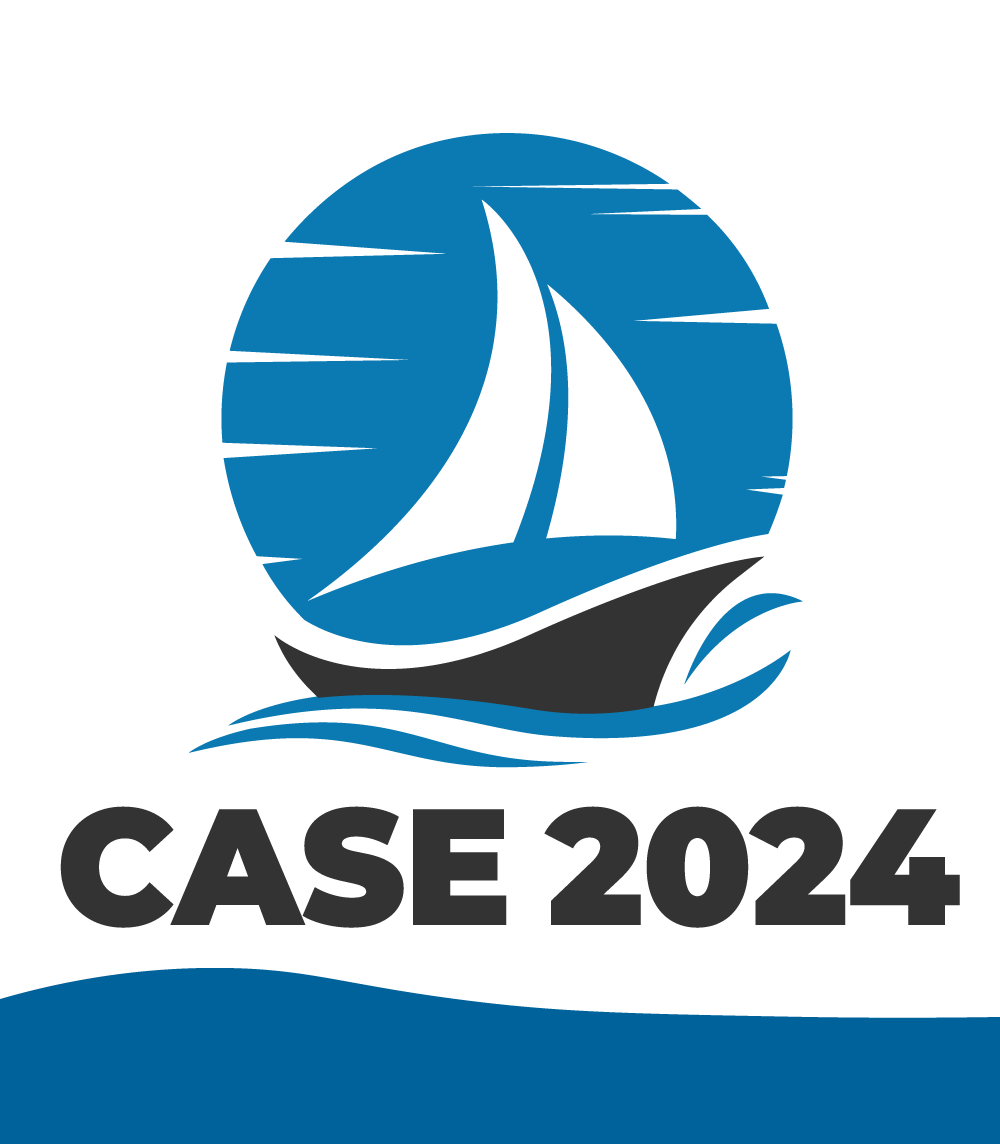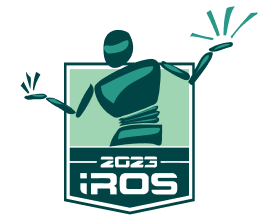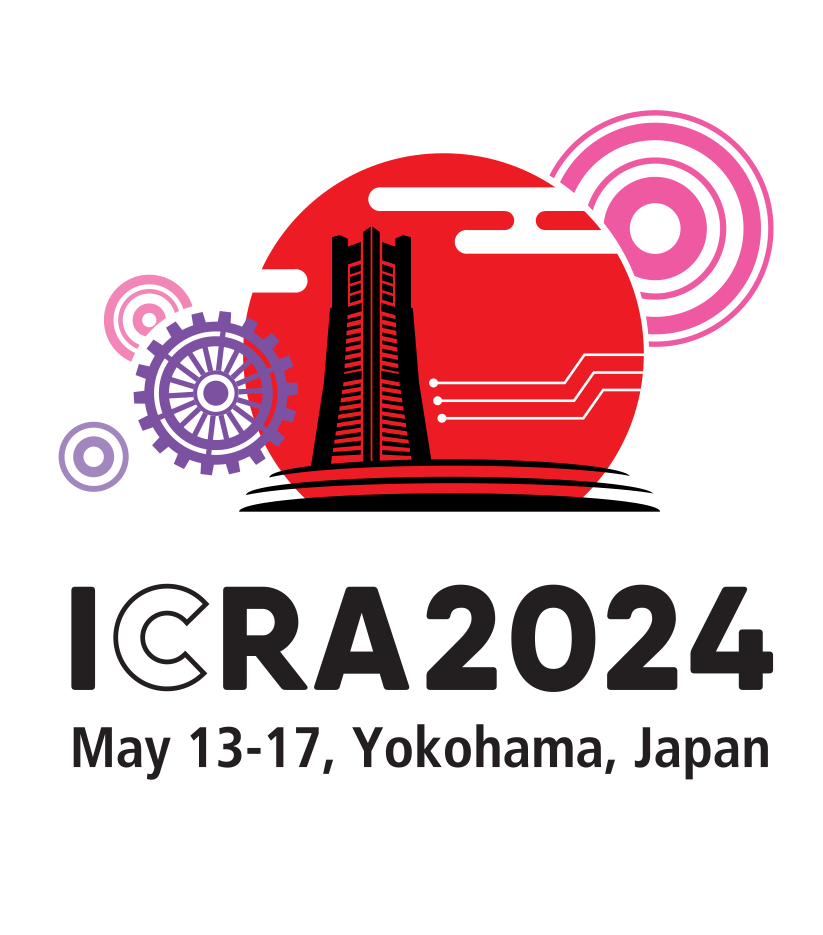Latest News
To foster the entrepreneurial spirit and to provide a platform to encourage researchers and practitioners to transition ideas and prototypes to commercializable products, the IEEE Robotics and Automation Society's Industrial Activities Board invited the robotics and automation community to participate in an Entrepreneurship Forum and Start-up Competition (EFSC) at the 2015 IEEE/RSJ International Conference on Intelligent Robots and Systems (IROS'15) held in Hamburg, Germany on 1 October 2015. The event was intended to inspire, educate, enable, and empower researchers, students, young professionals, and anyone else who has the 'start-up bug' in starting companies of their own but is not sure of how to go about it.
After a rigorous review process, 12 finalists were selected to make their final 'pitches' in Hamburg. In an interim Coaching stage, the finalists were paired with an expert to fine-tune their presentation and ideas to present at the Finals, where they made a 5 min. presentation (followed by a 5 min. Q&A session) to a distinguished judging panel of from the industry, and academia. The presentations were judged based on the following seven criteria: business idea, customer benefit, competitive advantage, market analysis, management, traction, and financial concept.
The judges were IEEE and RAS Member Dominik Boesl (Corporate Innovation Manager, KUKA AG, Germany), Francois Boucher (Chief Business Development Officer, Kinova, Canada)IEEE and RAS Member Ryan Gariepy (CTO, Clearpath Robotics, Canada), IEEE and RAS Member Nikolaos Papanikolopoulos (Distinguished McKnight University Professor, Univ. of Minnesota, USA), Slawomir Sander (Bosch Robotics, Germany), IEEE and RAS Member Alin Albu-Schaeffer (Head of the Institute of Robotics and Mechatronics, DLR, Germany), and IEEE and RAS member Nicola Tomatis (CEO, Bluebotics, Switzerland).
The top 3 finishers of the first IEEE RAS Start-up Competition were:
GRAND WINNER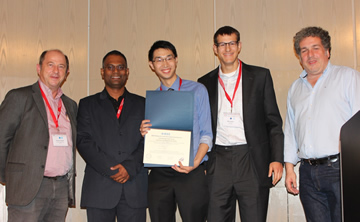
IEEE and RAS Student Member Alvin Chen, from VascuLogic whose business idea was a portable, image-guided medical robot that improves the accuracy, safety, and cost-effectiveness of venipuncture by drawing blood and performing intravenous procedures in an automated fashion.
SECOND PLACE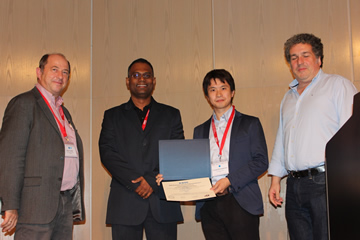
IEEE and RAS Member Kenji Suzuki, from PLIMES Ltd. whose business idea was social problem solving by dramatically enhancing Quality of Life of people with lower body paralysis or elderly people through the use of passive exoskeletons with smart mechatronics in personal mobility.
THIRD PLACE 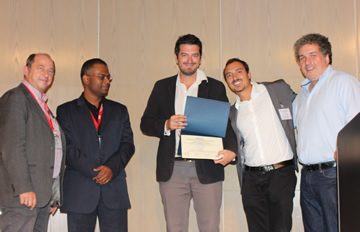
Francesco Maria Petrini and Stanisa Raspopovic from SensArs Neuroprosthetics Sàrl whose business idea was SENSY, a unique device enabling amputees don't have feelings from their prosthesis to feel skin softness or a stone trampled during walking.
The three winners took home US$15,000, US$10,000, and US$5,000, respectively. All finalists were provided travel support of up to US$1250. Financial sponsorship provided by IEEE-RAS, IEEE, and KUKA is gratefully acknowledged.
More information on the Start-up Competition, the 12 finalists and their business ideas are available from
http://iros2015.org/index.php/program/entrepreneurship-forum-start-up-competition/.
posted 14 October 2015
The IEEE Robotics & Automation Society's second standard, Robot Map Data Representation for Navigation, has been approved by the IEEE Standards Board for publication! RAS was the Sponsor of this standard, P1873 (http://standards.ieee.org/findstds/standard/1873-2015.html).
This standard defines a common representation for two-dimensional robot map data, including metric and topological maps. It is intended to facilitate interoperability among different navigating robots, extending their operational range and application areas by defining a recommended format for exchanging map data. This standard is expected to overcome the incompatibility among map data formats of the different software tools, easing re-use of existing software and integration of system components coming from different stakeholders.
The Working Group Chairs are Wonpil Yu (ETRI, Korea) and Francesco Amigoni (Politecnico di Milano, Italy). Congratulations to all WG members!
posted 21 September 2015
This year's joint Lunch with Leaders and Young Professionals Luncheon event aims at introducing the RAS Young Reviewer Program (YRP), a new initiative to provide the IEEE RAS students with sound practices in peer reviewing of scientific papers. This event hosts the RAS community's distinguished leaders:
Raja Chatila - RAS President, Fumihito Arai, Allessandro De Luca, Oussama Khatib, Ron Lumia, Kevin Lynch, Tony Maciejewski, Raj Madhavan, Allison Okamura, David Orin, Stefano Stramigioli, Satoshi Tadokoro, Jing Xiao
and three invited speakers
Nancy Amato, Seth Hutchinson, Wolfram Burgard
The Speakers will introduce and openly discuss the most salient challenges in peer reviewing of the scientific papers. Wolfram Burgard will talk on "writing skills" of the scientific papers. Seth Hutchinson will talk about "peer-reviewing" of the scientific papers. The session will be moderated by Nancy Amato, and will be followed by general discussions, offering multiple perspectives from leaders of the RAS about what it takes to be a leader in our profession.
The Luncheon will be held at IROS 2015 in Hamburg, Germany on September 30: Congress Center Hamburg - Hall 6
Advanced registration is required. The cost is $5 per lunch.
Click here to register
********************************
About the Young Reviewer Program (YRP)
The Young Reviewer Program (YRP) aims at introducing Robotics and Automation Society (RAS) students and young professionals to sound practices in peer reviewing of scientific papers. To achieve this objective, student YRP members will be supervised by Senior Reviewers (SR) in regular RAS review procedures. In addition to such a mentor-mentee relationship, YR members will have the opportunity of attending webinars and online tutorials to further explore and improve their writing and reviewing skills. Once a certain level of expertise is achieved, the YR will graduate with an overall qualification grade.
It is important to note here that within the YRP, the timing and the quality of the review to be delivered to the Associate Editors (AE), will be monitored and certified by the SRs. In addition, YRP will apply multiple safeguards to maintain confidentiality in the peer review process.
To join the Young Reviewer Program, please register at https://parasol.tamu.edu/ieee/ras-yrp
YRP Committee:
Arash Ajoudani (Arash.Ajoudani@iit.it), Tamás Haidegger (haidegger@ieee.org) and Seth Hutchinson (seth@illinois.edu)
posted 16 September 2015
Ballots were mailed and emails with election information were sent on 9 September 2015 to all Higher Grade IEEE Robotics and Automation Society Members and Affiliates (excluding Students) whose memberships were effective prior to 10 August 2015. If you did not receive an email from ieee-rasvote@ieee.org or a paper ballot by 24 September 2015, but you feel your membership was valid before 10 August 2015, you may email ieee-rasvote@ieee.org or call +1 732 562 3904 to check your member status. (Provide your member number, full name, and address.)
 Use https://eballot4.votenet.com/IEEE to access the ballot and cast your vote now. If you do not remember your password, you may retrieve it on the voter login page.
Use https://eballot4.votenet.com/IEEE to access the ballot and cast your vote now. If you do not remember your password, you may retrieve it on the voter login page.
Voting must be completed no later than 21 October 2015. Any returns received after this date will not be counted. The online voting site will close at 4:00 pm Eastern Time.
If you have any questions about the IEEE Robotics and Automation Society voting process, please contact ieee-rasvote@ieee.org or +1 732-562-3904.
The 11th annual IEEE International Conference on Automation Science and Engineering (CASE 2015) was held on 24-28 August 2015, in Gothenburg, Sweden. IEEE CASE represents the flagship automation conference of the IEEE Robotics and Automation Society. The conference aims to bring together researchers in automation from both industry and academia, together with industrial practitioners, to present and discuss the latest advances and developments in automation science and engineering.
Congratulations to the following winners of IEEE RAS and CASE Awards:
IEEE Transactions on Automation Science and Engineering
Best Paper Award - Two Recipients this Year!
Ahmed Nazeem, Spyros Reveliotis
"Efficient Enumeration of Minimal Unsafe States in Complex Resource Allocation Systems"
vol. 11, no. 1, pp. 111-124, 2014
Wooram Park, Gregory S. Chirikjian
"An Assembly Automation Approach to Alignment of Noncircular Projections in Electron Microscopy"
vol. 11, no. 3, pp. 668-679, 2014
IEEE Transactions on Automation Science and Engineering
Best New Application Paper Award - Two Recipients this Year!
Hamal Marino, Christos Bergeles, Bradley J. Nelson
"Robust Electromagnetic Control of Microrobots Under Force and Localization Uncertainties"
vol. 11, no. 1, pp. 310-316, 2014
Kevin R. Gue, Kai Furmans, Zäzilia Seibold, Onur Uludag
"GridStore: A Puzzle-Based Storage System With Decentralized Control"
vol. 11, no. 2, pp. 429-438, 2014
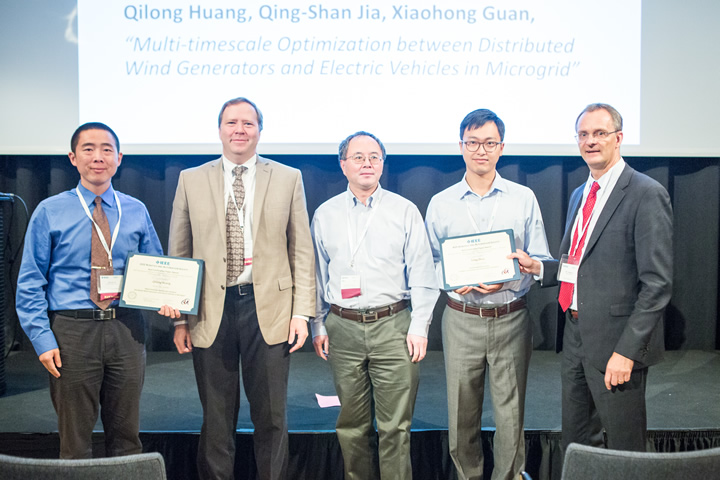
Best Conference Paper Award - Two Recipients this Year!
Cong Zhao, Jingshan Li, Ningjian Huang
"Plant Flexibility Planning: Problem Formulation and Performance Estimation"
Qilong Huang, Qing-Shan Jia, Xiaohong Guan
"Multi-timescale Optimization between Distributed Wind Generators and Electric Vehicles in Microgrid"
Best Application Paper Award
Saigopal Nelaturi, Gregory Burton, Christian Fritz, Kurtoglu Tolga
"Automatic Spatial Planning for Machining Operations"
Best Student Paper Award
Peng Wang (Student), Xinyao Tang, Robert Gao
"Automated Performance Tracking for Heat Exchangers in HVAC"
posted 31 August 2015
We're excited to announce that the Entrepreneurship Forum & Start-up Competition (EFSC) at IROS'15 will provide travel support for all finalists, and prizes for the top 3 finishers, totaling $45k. Don't miss this exciting opportunity to be mentored and evaluated by a distinguished panel of coaches and judges in a forum where you can fine-tune and pitch your ideas at one of the premier conferences of robotics and automation. We look forward to receiving your application.
ENTREPRENEURSHIP FORUM & START-UP COMPETITION (EFSC)
1 October 2015
2015 IEEE/RSJ International Conference on Intelligent Robots and Systems (IROS'15)
http://iros2015.org/index.php/program/entrepreneurship-forum-start-up-competition
In the last few years, entrepreneurship in robotics and automation has received renewed interest due to several high profile acquisitions (e.g. Amazon's $775 million acquisition of Kiva Systems in early 2012 and Google's acquisition of eight robotics companies in late 2013) among other success stories (e.g. DJI valued at $8 billion as of May 2015). To foster the entrepreneurial spirit and to provide a platform to encourage researchers and practitioners to transition ideas and prototypes to commercializable products, the IEEE Robotics and Automation Society (IEEE RAS) is inviting the robotics and automation community to participate in an Entrepreneurship Forum and Start-up Competition (EFSC) at the 2015 IEEE/RSJ International Conference on Intelligent Robots and Systems (IROS'15) in Hamburg (http://iros2015.org/).
The event is intended to inspire, educate, enable, and empower researchers, students, young professionals, and anyone else who has the 'start-up bug' in starting companies of their own but is not sure of how to go about it. We also believe that this event will create an ecosystem that will provide the much-needed support for start-ups to launch their initiatives while being realistic about their envisioned ideas and products. Previous IEEE RAS events centered on the entrepreneurship topic have been held at IROS'13 (Tokyo) and IROS'14 (Chicago) and served as starting points for discussions on identifying gaps and building bridges between industry, academia, government, and end-users (see http://www.iros2013.org/industry-forum.html and http://www.iros2014.org/program/industry-forumhttp://www.iros2014.org/program/industry-forum).
EFSC at IROS'15 will consist of three stages:
* In the first stage, submitted applications will be down-selected to arrive at a pool of qualified applicants based on a defined set of criteria developed by the organizers (see 'Application Form' information below).
* This will be followed by a remote stage where the selected applicants will be paired with coaches based on the proposal content and the expertise of the coaches. The coaches will then critique, and provide technical and professional assistance to refine the idea/product pitches.
* The final stage would allow for the refined pitches and content to be presented in front of a distinguished panel of venture capitalists, industry, and academic experts who have successfully funded, transitioned and have experience in commercialization of robotics and automation technologies.
WHO CAN PARTICIPATE?
Anyone with an idea or a prototype/product utilizing robotics and/or automation technology is welcome to submit an application provided that the entity is 1) less than 2 years old, and 2) has not received any funding from angel investors or venture capitalists in the last 5 years.
HOW TO PARTICIPATE?
Interested applicants should complete the Application Form available for download from http://iros2015.org/images/downloads/EFSC_IROS2015_ApplicationForm.doc.
Please email completed forms to iros2015.efsc@gmail.com.
TRAVEL SUPPORT & AWARDS
We anticipate travel support for all qualified applicants invited to IROS'15 in addition to awards for the top 3 finishers (totaling $45k). We gratefully acknowledge the support from IEEE and KUKA.
IMPORTANT DATES
* Submission of Application Forms: 20 August 2015
* Announcement of Selected Applicants: 1 September 2015
* Final Presentations at IROS'15: 1 October 2015
posted17 August 2015
"For pioneering contributions to design and implementation of distributed, cooperative robotics and automation systems for commercial applications"
 Spanning academics, business, and the arts, Raffaello D'Andrea's career is built on his ability to bridge theory and practice. He was the faculty advisor and system architect of the Cornell Robot Soccer Team, four-time world champions at the international RoboCup competition. He was one of the first in the controls community to use a multi-vehicle testbed for research. At ETH Zurich, his research redefines what autonomous systems are capable of. He is co-founder of Kiva Systems, a robotics company that revolutionized material handling by deploying thousands of autonomous mobile robots in warehouses. He recently founded Verity Studios, a company developing a new breed of interactive and autonomous flying machines.
Spanning academics, business, and the arts, Raffaello D'Andrea's career is built on his ability to bridge theory and practice. He was the faculty advisor and system architect of the Cornell Robot Soccer Team, four-time world champions at the international RoboCup competition. He was one of the first in the controls community to use a multi-vehicle testbed for research. At ETH Zurich, his research redefines what autonomous systems are capable of. He is co-founder of Kiva Systems, a robotics company that revolutionized material handling by deploying thousands of autonomous mobile robots in warehouses. He recently founded Verity Studios, a company developing a new breed of interactive and autonomous flying machines.
Prof. D'Andrea is Professor of Dynamic Systems and Control at ETH Zurich.
The IEEE Robotics and Automation Award was established in 2002 by the IEEE Board of Directors, and is presented for contributions in the field of robotics and automation. It includes but is not limited to: manufacturing automation; robotics and automation in unstructured environments; sensor design; integration and fusion; robot design; modeling; planning and control; methodologies for robotics and automation, and the quality of the nomination.
Past Recipients can be found HERE
posted 6 August 2015
The IEEE Robotics & Automation Society’s Chapters and International Activities Committee (CIAC) and the Student Activities Committee (SAC) under the Member Activities Board, have developed a new Regional Student Representatives (RSR) initiative.
Regional diversity presents a challenge for RAS to effectively implement universal programs and engage students. In response, the RSR program assigns representatives to serve as ambassadors from the SAC to local student chapters and better facilitate communication between the two groups.
The primary responsibilities for each representative include:
•Initiate regional specific programs and competitions
•Participate in regular SAC and CIAC meetings to represent local student chapters
•Oversee student communication via mailing lists and social media
Additional responsibilities will vary according to region in order to better serve the RAS community at large. RSRs will work closely with SAC and CIAC and student chapters in their regions in order to promote student involvement in IEEE and RAS.
Regional student representatives have been appointed to represent Region(s) 1-7, 8, 9, and 10. They are Thassyo Pinto, Emad Omari, Victor Carranza and Tony K James respectively. Each representative is passionate about the community and excited to help facilitate local involvement. Please visit the formal RSR announcement to learn more about each representative.
This is a new program so we are especially interested in your ideas! To learn more or get involved, please contact your regional representative directly or email rasrsr@googlegroups.com for general questions about the program!
Chapters and International Activities Committee
Xiaorui Zhu, Co-Chair
Kenji Suzuki, Co-Chair
Student Activities Committee
Lauren Miller, Chair
Megan Emmons, Co-Chair
Posted on 23 July 2015
IEEE Robotics & Automation Magazine is soliciting nominations for two new associate editors to begin in January 2016. The associate editors play an important role in maintaining the caliber of the magazine by ensuring the quality of published articles by implementing reviews of technical features according to IEEE guidelines, soliciting interesting and topical material articles for publication in the magazine, guiding the overall direction of the publication and providing feedback from the readership through e-mail conversations, teleconferences, and twice-yearly in-person meetings held in conjunction with the IEEE Conference on Robotics and Automation and the IEEE International Conference on Intelligent Robots and Systems.
Associate editor terms normally consist of a one-year probation period followed by two years of additional service if performance is satisfactory. Applicants should have a strong technical background and excellent English language skills.
Nominations should include a resume (not to exceed three pages), previous experience with publications as a reviewer or in other capacities, and areas of technical expertise. Please submit nominations as a single pdf file to Rachel O. Warnick at r.o.warnick@ieee.org by 30 September 2015.
Posted 1 July 2015
Congratulations to the IEEE Robotics & Automation Society Members who have been elevated in 2015 to Senior Members, the highest grade for which IEEE members can apply.
|
Karyn Apfeldorf |
Himani Goyal Sharma |
Jeffrey Miller |
|
Tatsuo Arai |
Keith Green |
Hyun Myung |
|
Amarnath Banerjee |
Qi Kang |
Yasushi Nakauchi |
|
Timothy Barfoot |
Ali Karimoddini |
Gerasimos Rigatos |
|
Taktok Bezine |
Jonghyuk Kim |
Jose Santos-Victor |
|
Oliver Brock |
Hadas Kress-Gazit |
Khaled Shaban |
|
Aidan Browne |
Vilas Kumar |
Rajat Singh |
|
Jose Casallas |
K Kyriakopoulos |
Stephen Smith |
|
Jorg Conradt |
Bengt Lennartson |
Zhiwei Song |
|
Susan Corwin |
Hun-Ok Lim |
Lydia Tapia |
|
Jian Dai |
Dikai Liu |
Jocelyne Troccaz |
|
Michael Daily |
Zhi-Yong Liu |
Hesheng Wang |
|
Amro Farid |
Konrad Markowski |
Michael Wellfare |
|
Arianna Menciassi |
Robert Zlot |
Posted 20 July 2015
The 2015 IEEE RAS Summer School on Experimental Methodology, Performance Evaluation and Benchmarking in Robotics being held in Benicasim, Spain on 14-18 September is open for registration.
For more visit: http://ieee-raspebras2015.org/
The IEEE-RAS Technical Committee on Performance Evaluation & Benchmarking of Robotic and Automation Systems (TC PEBRAS) has organized a Summer School as part of the IEEE RAS Technical Education Program. As the complexity of robotic and intelligent systems grows, it is more and more necessary to adhere to sound experimental approaches and benchmarking procedures. It is of fundamental importance that the next generation learns good experimental, performance evaluation and benchmarking methods as part of their technical education.
IEEE graduate students will have a unique training opportunity in these important topics. Students will closely interact for one week with some of the top-level researchers in the world relevant to this domain. They will also have the opportunity to discuss their research work with them.
Aims and scope
Participants will learn how to implement approaches with exhaustive experimental methodology and apply appropriate benchmarking procedures to compare the actual practical results with reference to standard accepted procedures; how experimental results can be replicable and refutable on the one hand, and quantitatively comparable according to community-endorsed metrics, on the other hand. At the end, a student should be able to provide an educated response tob the following questions:
- How research should be performed and reported in order to allow result replications
- How should competitions be designed in order to maximize their contribution to robotics research and the industrial exploitation of results
- To which extent and for measuring which functionalities and capabilities are benchmarks useful and possible
- Which balance of result replication, benchmarking, challenges and competitions would allow a more objective evaluation of results and consequent objective assessment of the state of the art in the various subfields of their domain of research
Posted 15 July 2015
The IEEE Robotics & Automation Magazine is issuing a call for papers for a special issue on Soft Robotics and Morphological Computation.
Introduction
Soft robotics and morphological computation are two recent exciting trends in robotics that are expected to provide novel approaches and high-impact applications. The use of soft and deformable materials in robotics system is crucial to deal with uncertain task and environments such as locomotion in rough terrains, grasping and manipulation of unknown and unstructured objects. Soft robots can be characterized by elastic and deformable bodies, a large number of degrees of freedom, the use of unconventional functional materials, and the involvement of intrinsic passive dynamics. All of these properties could provide significant advantages to adaptability of robotic systems if they are treated properly. The research field of morphological computation, on the other hand, explores the concepts and theories of computation in physical systems, where we investigate how motion control processes can be distributed over informational and physical dynamics. It has been previously shown that, by properly designing the dynamics, physical systems such as soft robotic grippers can benefit from simplified control architectures and improved overall performances. The special issue of “Soft Robotics and Morphological Computation” in IEEE Robotics and Automation Magazine (IEEE-RAM) aims to summarize the state of the art of soft robotics and morphological computation research areas, and to provide a venue for the fruitful collaborations between these two research fields. The desired outcome of this special issue is to develop a general consensus about the scientific goals, perspective and challenges of the two research fields, as well as high impact applications.
Topics
We invite review/position papers of topics related to soft robotics, morphological computation and the intersection between the two fields.
The topics include but not limited to:
• Artificial skin and stretchable sensors and electronics
• Bio-inspired or biomimetic robots based on passive dynamics and unconventional materials
• Continuum robots, flexible robots, reconfigurable robots
• Functional materials, morphologies, and assembly for adaptive robotic systems
• Modeling and simulation of soft bodied robots and structures
• Natural computation, unconventional computation for adaptive robotic systems
• Physical human-robot interactions based on soft technologies
• Wearable robotics
Timeline
Deadline for Paper Submission: 10 November 2015 - EXTENDED TO 1 December 2015
Review Completion and Acceptance Notification: 28 February 2016
Final Submission: June 2016
Publication: September 2016
Guest Editors
Fumiya Iida (University of Cambridge), Cecilia Laschi (Scuola Superiore Sant'Anna), Dario Floreano (EPFL), Robert Wood (University), Surya Nurzaman (Monash University), Andre Rosendo (University of Cambridge)
Posted 30 June 2015
Edited 2 November 2015
Congratulations to the following ICRA 2015 Award Recipients! Winners were announced and honored during the RAS Awards Luncheon which took place on 28 May 2015 in Seattle, (WA) USA. The complete list of Recipients and Finalists, with photos, is available here.

Best Associate Editor Award
Eric Diller, University of Toronto, Canada
Paolo Robuffo Giordano, CNRS, Irisa/Inria Rennes, France
Best Reviewer Award
Renaud Detry, Université de Liège, Belgium
Andrej Gams, Jožef Stefan Institute, Slovenia
Hedvig Kjellstrom, KTH Royal Institute of Technology, Sweden
Raul Suarez, Universitat Politècnica de Catalunya (UPC), Spain
Best Paper Awards
ICRA Automation Best Paper
Design, Modeling and Control of a Modular Contactless Wafer Handling System
Bassem Dahroug, Guillaume J. Laurent, Valérian Guelpa, Nadine Le Fort-Piat
ICRA Cognitive Robotics Best Paper Award
Grounding Spatial Relations for Outdoor Robot Navigation
Abdeslam Boularias, Felix Duvallet, Jean Oh, Anthony Stentz
ICRA Medical Robotics Best Paper Award
An Ankle-Foot Prosthesis Emulator with Control of Plantarflexion and Inversion-Eversion Torque
Steven H. Collins, Myunghee Kim, Tianjian Chen, Tianyao Chen
ICRA Robot Manipulation Best Paper Award
Learning Contact-Rich Manipulation Skills with Guided Policy Search
Sergey Levine, Nolan Wagener, Pieter Abbeel
ICRA Robot Vision Best Paper Award
Work Smart, Not Hard: Recalling Relevant Experiences for Vast-Scale but Time-Constrained Localisation
Chris Linegar, Winston Churchill, Paul Newman
ICRA Service Robotics Best Paper Award
RoboSherlock: Unstructured Information Processing for Robot Perception
Michael Beetz, Ferenc Balint-Benczedi, Nico Blodow, Daniel Nyga, Thiemo Wiedemeyer, Zoltan-Csaba Marton
ICRA Best Student Paper
Grasping without Squeezing: Shear Adhesion Gripper with Fibrillar Thin Film
Elliot Wright Hawkes, David Christensen, Amy Kyungwon Han, Hao Jiang, Mark Cutkosky
ICRA Best Conference Paper
Observability, Identifiability and Sensitivity of Vision-Aided Inertial Navigation
Joshua Hernandez, Konstantine Tsotsos, Stefano Soatto
Challenges
Amazon Picking Challenge
Organizers: Pete Wurman and Joe Romano, Kiva Systems
In recognition of teams that demonstrate the best automated item picking.
1st Place - $20,000
Team RBO, TU Berlin, Oliver Brock
2nd Place - $5,000
Team MIT, MIT, Alberto Rodriquez Garcia
3rd Place - $1,000
Team Grizzly, Dataspeed Inc. & Oakland University, Paul Fleck
Humanitarian Robotics and Automation Technology Challenge
Organizers: Raj Madhavan, Lino Marques, Edson Prestes, Prithviraj Dasgupta
Winner: Team NUS: National Univ.of Singapore, Singapore
Humanoids Application Challenge
Organizers: Kayla Kim and Jinwook Kim, ROBOTIS CO
In recognition of the team that demonstrates the most creative application of humanoid research.
Winner: Team Snobots, University of Manitoba
Mobile Microrobotics Challenge 1
Autonomous Mobility & Accuracy Challenge
In recognition of the team with the most accurate trajectory traversals
Winner: University of Hawaii, Manoa (Sammy Khamis, Edward Nerad, Leanne King, Caralyn King, Aaron Ohta)
Mobile Microrobotics Challenge 2
Microassembly Challenge
In recognition of assembling the most micro-scale components in a micro channel
Winner: ETH Zurich (Samuel Charreyron, Janis Edelmann, Andrew Petruska, Franziska Ullrich, Chengzhi Hu, Hen-Wei Huang, Qi Zhang, Erdem Siringil, Roel Pieters, Bradley J. Nelson)
Mobile Microrobotics Challenge 3
MMC Showcase & Poster Session
In recognition of the most innovative mobile micro-robotic system
Winner: UVT Romania, University Valahia of Targoviste (Ioan Alexandru Ivan, Florin Dragomir, Valentin Gurgu, Nicolae Radulescu, Mihaela Ivan)
posted 11 June 2015
The IEEE Robotics & Automation Magazine is set to publish a special issue on Educational Robotics in June 2016. Currently, there is a call for papers with a deadline for submission of 15 July 2015.
The scope of this special issue is to advance knowledge in the field of robotics applied to formal and informal education. The idea of robots as educational tools goes back to the late 60s, when Seymour Papert formulated the theory on learning called “constructionism”, which points out the relevant role played by artefacts in the learning process. Educational robotics broadly refers to the use of robots for educational purposes. There are several ways in which robotics and robots have been employed in educational activities: from object of study to medium that facilitates the transfer of knowledge and even companion, in which the robot performs the role of tutor or peer during the learning process.
Complete details are available at http://www.ieee-ras.org/publications/ram/ram-special-issues.
Posted 17 April 2015.
At the IEEE Technical Activities Board Meeting Series held in January 2015, the IEEE Robotics & Automation Society (RAS) received approval to launch a new periodical. Under the name, the IEEE Robotics and Automation Letters (RA-L), the first issue is planned for January 2016.
The scope of this journal is to publish peer-reviewed articles that provide a timely and concise account of innovative research ideas and application results, reporting significant theoretical findings and application case studies in areas of robotics and automation.
The primary goal of RA-L is to better serve the RAS membership and the robotics and automation community at large, which has strongly increased in number and productivity, by providing more capacity for high quality, fully reviewed journal papers. Additional goals of RA-L are to provide a publication process that is complementary to the existing evolutionary process from RAS conferences into journal papers and to improve the efficiency of the peer-review process.
RA-L will publish papers reporting on innovative ideas and unpublished results that need to be rapidly published. To this purpose, RA-L will provide a final decision on manuscripts within six months from submission. Papers will be six pages long, with at most two extra pages allowed at a charge, and will allow open-access for those authors who require it. The review cycle will follow the highest standards of IEEE periodicals. Each paper will be assigned to a Senior Editor, hence to an Associate Editor and at least two independent reviewers. The review process may also include a fast revise-and-resubmit process, upon which the Letters Editorial Board (LEB) will make a final decision. Finally, accepted papers will be electronically archived on IEEE Xplore, and will be available for early access by readers only few days after submission of the final version, while an edited and XML-tagged version for searching and indexing will be available soon after. RA-L is an electronic-only journal.
A unique feature of RA-L is the opportunity for authors to publish a paper in a peer-reviewed journal and present the same paper at the flagship conference of RAS: the IEEE International Conference on Robotics and Automation (ICRA). While submission to RA-L is open throughout the year, indeed, there will be a time window during which authors will have an option for their submission to be also considered for presentation at the following ICRA. This year, the window is between 1 July and 31 August 2015 for ICRA 2016.
Further details on the process to submit to RA-Letters will be available in the coming weeks.
Posted 7 April 2015
A Discipline-Specific Workshop is being sponsored by CRA-W and the Coalition to Diversify Computing affiliated with ICRA 2015. Student travel scholarships available for U.S. students.
The goal of this workshop is to introduce students to the exciting research area of robotics and to provide students currently doing research in robotics with valuable career-building information. Robotics is a very unique field that requires applied engineering, basic science, and strong creativity. The integration of these three areas often proves challenging. Despite this challenge, robots are becoming ubiquitous tools for many daily tasks including manufacturing, package delivery, and in home assistance. In order to prepare the next generation of robotics researchers, this workshop will address several discipline-specific challenges of robotics and strategies to overcome these challenges including the integration of hardware and software and multi-disciplinary integration required.
Undergraduate and graduate students are the primary audience of this workshop. Scholarships will be available to fund travel and attendance. Underrepresented minorities are especially encouraged to apply.
Application Deadline:
11 April 2015 at 11:59 pm PDT
The scholarship announcements are expected to be made by 18 April 2015.
The application is available at:
http://www.cs.unm.edu/amprg/robotGuru/emails/CFP.txt?
Workshop webpage: http://www.cs.unm.edu/amprg/robotGuru/
For additional information, please contact:
Cindy L. Bethel, Ph.D.
Mississippi State University
cbethel@cse.msstate.edu
posted 6 April 2015
Will you be organizing a Conference in the coming months? Are you considering organizing a conference? Then, this Workshop is for YOU!
RAS will host a Conference Organizers Workshop at the International Conference on Robotics and Automation (ICRA 2015) on Wednesday afternoon, 27 May from 13:30-17:30. Get answers to your questions about the organization, requirements, logistics, technical program and finances of conferences, both large and small. Speak with the experts for advice on how to make sure your conference is executed flawlessly!
Space is limited, so we encourage you to register as soon as your availability is confirmed.
Please register for this FREE workshop on-line:
https://adobeformscentral.com/?f=2ZE8ns0WdXgEkDnxSb32qQ
Presenters to include:
RAS Associate VP - Conference Finance: Paolo Fiorini
RAS Associate VP - Conference Operations: Torsten Kroeger
RAS Treasurer: Ron Lumia
IEEE Conference Expert: Alicia Zupeck
IEEE Meetings, Conferences and Events: Julie Amodeo
IEEE RAS Staff: Kathy Colabaugh
For more information see: http://www.ieee-ras.org/about-ras/ras-calendar/event/677-conference-organizer-workshop
posted 18 March 2015
Each year, the IEEE Robotics & Automation Society offers financial support for three Technical Education Programs (RAS-TEP), formerly Summer Schools. In efforts to bring RAS closer to its membership, these programs rotate though the Americas, Europe and Asia and Pacific.
The RAS-TEP program is jointly run by the Member Activities Board (MAB) and the Technical Activities Board (TAB). The program is intended to sponsor or co-sponsor up to three summer schools per year around the world. One of the three summer schools will be fully sponsored by RAS to a level of $40,000, and it will rotate annually through RAS' three geographical regions in a round robin fashion. The other two summer schools will be cosponsored with interested organizations in the other two geographical regions up to a level of $20,000 each. In 2016, Full sponsorship ($40,000) is available for for Area 3 (Asia, Pacific)
The review of Technical Education Program proposals is based on assessments from two different viewpoints, the first one with respect to the general structure, including organizational matters and budget, and the second one with respect to the technical content. Suited Technical Committees (TCs) of the RAS have to endorse the proposal.
RAS Technical Education Programs are designed to directly benefit RAS Student Members. At least 50% of the attendees should be RAS members, and will receive support through TEP funding.
Techncial Education Program Proposal - online form
IMPORTANT DATES
Deadlines for the submission of 2016 proposals: 1 May 2015
Decision Notification: 1 July 2015
posted 10 March 2015
Call for Papers: IEEE Transactions on Robotics
Special Issue on Movement Science for Humans and Humanoids: Methods and Applications
Paper Submission deadline: 1 August 2015
Over the past three decades, computationally efficient techniques for the analysis, simulation, and optimization of articulated bodies have been developed by the robotics and mathematical communities. With recent advances in computational power and improved algorithms, these techniques are being applied to increasingly complex structures like the human body. More generally, the use of robotics formalisms for quantitative human motion analysis and synthesis is enabling new applications in, e.g., medical diagnosis, monitoring and feedback during rehabilitation and sports training, animation, ergonomic analysis and design, and improved rehabilitation and assistive robots and devices. At the same time, methods initially developed for human motion analysis in other fields like biomechanics, neuroscience, computer graphics, and computer vision are increasingly being used in robotics, in topics ranging from human-robot interaction to imitation learning.
Scope:
This special issue seeks submissions describing novel work synthesizing multidisciplinary techniques for human and humanoid motion analysis, synthesis, and control.
Topics of interest include:
- Kinematic and dynamic modeling and analysis of the human body
- Dynamic parameter estimation and optimum experimental design
- Optimal control of human and humanoid motions
- Inverse optimal control for identification of objective functions during human motor control
- Motion recognition, segmentation, modeling, and analysis
- Quantitative analysis methods for rehabilitation and sports training
- Robotics techniques for animation
- Neuromuscular control
- Musculoskeletal dynamics
- Rehabilitation robotics
- Human motion analysis and understanding for imitation learning and human-robot interaction
- Human-inspired control algorithms for robots
- Model-predictive control for movement science
- Human movement informing the design and control of assistive devices, exoskeletons and prostheses
- Robotics-based motion synthesis
Contributions must have a central connection to robotics; pure psychomotor or biomechanics studies are outside the scope of this special issue. Interested authors are encouraged to contact the special issue editors with an abstract of their paper to confirm that their submission is within the scope of the special issue.
Abstracts should be sent via email to dana.kulic@uwaterloo.ca
IMPORTANT DATES
Call for Papers: 1 March 2015
Deadline for Initial Paper Submission: 1 August 2015
Decisions for First Round Review: 15 October 2015
Deadline for Revised Paper Submission: 15 December 2015
Target Publication Date: February or April 2016
Guest Editors:
Dana Kulic, University of Waterloo
Katsu Yamane, Disney Research
Gentiane Venture, Tokyo University of Agriculture and Technology
Emel Demircan, University of Tokyo/Stanford University
Katja Mombaur, University of Heidelberg
posted 9 March 2015
Outdoor robotic competition on humanitarian demining
19-21 August 2015, Antofagasta, Chile
Minesweepers: Towards a Landmine-free World is the first international outdoor robotic competition on humanitarian demining. It aims at raising the public awareness of the seriousness of the landmines and UXOs contamination and fostering robotics research and its applications in the area of humanitarian demining in the world. In this competition, each participating team constructs a teleoperated/autonomous unmanned ground/aerial vehicle that must be able to search for underground and aboveground anti-personnel landmines and UXOs. The position and the type of each detected object are visualized and overlaid on the minefield map. The robot must be able to navigate through rough terrain that mimics a real minefield.
The fourth edition of Minesweepers: Towards a Landmine-free World is organized by Universidad Catolica del Norte (Catholic University of the North) in conjunction with The 6th International Conference on Computing and Informatics in Northern Chile (INFONOR-Chile 2015).
Minesweepers: Towards a Landmine-free World is organized in collaboration with IEEE Robotics and Automation Society – Egypt Chapter (2015 IEEE RAS Chapter of the Year Award and 2012 Chapter of the Year in IEEE Region 8) and Hadath for Innovation and Entrepreneurship. The competition is technically co-sponsored by IEEE RAS Special Interest Group on Humanitarian Technology (RAS-SIGHT). It is supported by Executive Secretariat for the Demining & Development of the North West Coast, Mines Action & Human Rights Foundation and Protection against Armaments & Consequences and African Robotics Network (AFRON).
The ultimate goal of the Minesweepers competition is to put into practice the new strategic mission of IEEE, "...to foster technological innovation and excellence for the benefit of humanity" and to serve as an educational and a research forum to provide efficient, reliable, adaptive and cost-effective solutions for the serious problem of humanitarian demining in many affected countries in the world. The competition also motivates the participants to create new companies and industries geared towards minefield reconnaissance and mapping technologies. Moreover, the applicability of the robotic systems presented in this competition can be extended to a wide range of other applications such as security and surveillance, search and rescue, health monitoring of civil infrastructure, pipeline monitoring, and environment monitoring.
IMPORTANT DATES
Competition Registration: 1 Feb to 15 Mar 2015
Video Submission Phase: 3 July 2015
Notification of Acceptance: 15 July 2015
International Competition:19-21 Aug 2015
For more information, please visit: http://www.landminefree.org/index.php/en/
posted 6 March 2015




